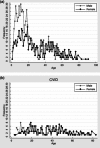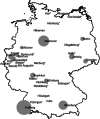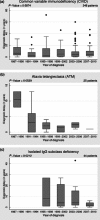The German national registry for primary immunodeficiencies (PID)
- PMID: 23607573
- PMCID: PMC3722937
- DOI: 10.1111/cei.12105
The German national registry for primary immunodeficiencies (PID)
Abstract
In 2009, a federally funded clinical and research consortium (PID-NET, http://www.pid-net.org) established the first national registry for primary immunodeficiencies (PID) in Germany. The registry contains clinical and genetic information on PID patients and is set up within the framework of the existing European Database for Primary Immunodeficiencies, run by the European Society for Primary Immunodeficiencies. Following the example of other national registries, a central data entry clerk has been employed to support data entry at the participating centres. Regulations for ethics approvals have presented a major challenge for participation of individual centres and have led to a delay in data entry in some cases. Data on 630 patients, entered into the European registry between 2004 and 2009, were incorporated into the national registry. From April 2009 to March 2012, the number of contributing centres increased from seven to 21 and 738 additional patients were reported, leading to a total number of 1368 patients, of whom 1232 were alive. The age distribution of living patients differs significantly by gender, with twice as many males than females among children, but 15% more women than men in the age group 30 years and older. The diagnostic delay between onset of symptoms and diagnosis has decreased for some PID over the past 20 years, but remains particularly high at a median of 4 years in common variable immunodeficiency (CVID), the most prevalent PID.
Keywords: DiGeorge syndrome; X-linked agammaglobulinaemia (XLA); chronic granulomatous disease (CGD); common variable immunodeficiency (CVID); immunodeficiency-primary.
© 2013 British Society for Immunology.
Figures




References
-
- Matamoros FloriN, Mila LlambiJ, Espanol BorenT, Raga BorjaS, Fontan CasariegoG. Primary immunodeficiency syndrome in Spain: first report of the National Registry in children and adults. J Clin Immunol. 1997;17:333–339. - PubMed
-
- Kirkpatrick P, Riminton S. Primary immunodeficiency diseases in Australia and New Zealand. J Clin Immunol. 2007;27:517–524. - PubMed
-
- CEREDIH: The French PID Study Group. The French national registry of primary immunodeficiency diseases. Clin Immunol. 2010;135:264–272. - PubMed
Publication types
MeSH terms
LinkOut - more resources
Full Text Sources
Other Literature Sources
Miscellaneous

